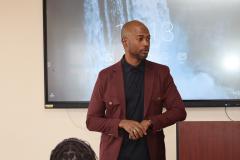VCs Weekly Higher Education Digest: April 1, 2019
The role of African universities as development partners By Eric Fredua-Kwarteng UNIVERSITY WORLD NEWS
In the 21st century African universities must shift to playing a new role as development partners in order to legitimize their existence, increase their relevance, boost their links to society and the economy and leverage African development…. This new role does not imply that African universities should form a new arm of government, in addition to the current executive, legislative and judicial arms. Nor does it suggest African universities should become a new government ministry.
https://www.universityworldnews.com/post.php?story=20190325145917781
Ethics at the Core By Carrie Klein and Michael Brown BUSINESS OFFICER
During the past decade, campuses have begun leveraging large sets of data to uncover previously unseen trends and drive strategic decision making. From measuring financial health, to optimizing enrollment and aid packages, to supporting student learning and advising, data analytics has the potential to help an institution meet its mission and improve student success…. Yet, inherent in the unique nature of data analytics is the potential for users to violate privacy and ethics rules.
https://www.businessofficermagazine.org/features/ethics-at-the-core/
Towards ethical universities via ethical governing boards By Peter D Eckel UNIVERSITY WORLD NEWS
Ensuring that boards behave in the best interests of their universities is important because boards are the fiduciary agents and the legal authority recognized by governments, courts and auditors. Unethical governance behaviors can be an immediate and time-consuming distraction for a university…. Ethical governance lapses range from inappropriate meddling in the work of management, such as hiring decisions, to the lack of board oversight of institutional finances.
https://www.universityworldnews.com/post.php?story=20190326131223755
5 change management strategies for higher ed programs By Mark Rowh UNIVERSITY BUSINESS
Change management is seldom easy for any higher ed administrator. And nowhere is this more evident than with the core of any college or university: its academic programs. In fact, the process can be something of a minefield, with faculty feeling threatened and the media poised to report dissension when programs are eliminated. Here are five change management strategies that administrators can use when leading faculty through academic program eliminations and additions.
https://universitybusiness.com/5-change-management-strategies-higher-ed-programs/
Chatbots in universities enhancing the student experience, improving operations By Carlos Melendez UNIVERSITY BUSINESS
Today’s universities are challenged with pretty intense competition for the best and brightest students, while retaining and nurturing those students throughout their college careers. It’s important to make sure students are the right fit from the start, while easing their transition to college and providing as much support as possible–a pretty tall order under any circumstances.
https://universitybusiness.com/chatbots-in-universities/
This Is How You Kill a Profession. How did we decide that professors don’t deserve job security or a decent salary? By Hell Childress THE CHRONICLE OF HIGHER EDUCATION
How did we discard the idea of college faculty? That is, how did we decide to systematically eliminate an entire class of professionals whom we once trusted to conduct the final distillation of our children into capable, confident adults? How did we come to decide that college teachers didn’t deserve job security, didn’t deserve health insurance, didn’t deserve to make more than convenience-store clerks? It wasn’t hard, really.
https://www.chronicle.com/interactives/2019-03-27-childress
How International Education’s Golden Age Lost Its Sheen By Karin Fischer THE CHRONICLE OF HIGHER EDUCATION
That golden era was born out of the grimmest of events: the September 11 terrorist attacks and the conviction that the violence – whose perpetrators were erroneously said to have been in the United States on student visas – called for greater engagement with the world, not less. Its end date came a decade and a half later, signaled by the election of Donald J. Trump, on a platform of America First. While it might be tempting to pin internationalization’s current challenges on President Trump and the nativist environment he has fomented, that explanation also seems insufficient.
https://www.chronicle.com/interactives/2019-03-28-golden-age
The Art of Executive Feedback By Rob Kramer THE CHRONICLE OF HIGHER EDUCATION
One of academe’s most glaring blind spots lies in how, and when, we evaluate our leaders. A recurrent problem, it’s even more acute now that higher education is constantly living under a microscope…. So how should we conduct executive evaluations, and deploy them with better results? Before tackling that, let’s explore the pros and cons of academe’s traditional methods of evaluating senior leaders.
https://www.chronicle.com/article/The-Art-of-Executive-Feedback/245730
What Is the Future of Town-Gown Relations? These Researchers Think They Know By Lindsay Ellis THE CHRONICLE OF HIGHER EDUCATION
Many colleges have boards and initiatives that focus on town-gown relations and research — say, a public-service graduation requirement or a commitment to purchase and hire from neighborhoods around the campus. But few community members actually play roles in leading or shaping those projects, according to a new report analyzing 100 urban college and university partnerships with their cities.
https://www.chronicle.com/article/What-Is-the-Future-of/245993
After the Elsevier ‘Tipping Point,’ Research Libraries Consider Their Options By Lindsay Ellis THE CHRONICLE OF HIGHER EDUCATION
Research librarians are giving notice: The pressures that led the University of California system to cut the cord with Elsevier aren’t foreign to their campuses. After the UC system announced last month that it would not renew its subscription contract with Elsevier, the journal-publishing giant, librarians are telling their faculty members that something’s got to give. Their budgets are flat, and prices of bulk journal subscriptions — dubbed “big deals” — keep going up.
https://www.chronicle.com/article/After-the-Elsevier-Tipping/245981
Assessment Is an Enormous Waste of Time By Erik Gilbert THE CHRONICLE OF HIGHER EDUCATION
The fundamental claim of the assessment industry is that by measuring one thing — student learning — it can show us how to improve our courses, curricula, and colleges. But what if learning isn’t the most important element of a college education? Then the underlying assumption behind assessment would be wrong. The assessment industry is not known for self-critical reflection.
https://www.chronicle.com/article/Assessment-Is-an-Enormous/245937
College Leaders Are Getting Serious About Outsourcing. They Still Have Plenty of Concerns, Too By Goldie Blumenstyk THE CHRONICLE OF HIGHER EDUCATION
Outsourcing at colleges ain't what it used to be. If you hear the term and think "dining services" or "bookstore," you're not wrong. But you'd be overlooking a range of other services that colleges increasingly eye as ripe for partnership with outside parties. Among them: managing online programs, predictive-analytics systems, skills training and boot camps, and even career counseling.
https://www.chronicle.com/article/College-Leaders-Are-Getting/245978?cid=wsinglestory
The False Promise of Elite Education By Jennifer M. Morton THE CHRONICLE OF HIGHER EDUCATION
Education is crucial to a democratic society because it is how we ensure that citizens will have the knowledge and skills our societies need. In countries such as the United States, Britain, and France, some colleges play a further role — they educate the elite…. These universities pride themselves not only on offering superb educational opportunities, but also on educating those who will go on to hold influential positions. Can a system of higher education for the elite be democratic?
https://www.chronicle.com/article/The-False-Promise-of-Elite/246011?cid=wcontentgrid_41_2
The Digital Humanities Debacle By Nan Z. Da THE CHRONICLE OF HIGHER EDUCATION
Quantitative methods are ascendant in literary studies, abetted by disproportionate funding, the absence of strict evaluative protocols, and a scarcity of knowledgeable and disinterested peer reviewers. It is time for the profession to take a closer look…. Not only has this branch of the digital humanities generated bad literary criticism, but it tends to lack quantitative rigor. Its findings are either banal or, if interesting, not statistically robust.
https://www.chronicle.com/article/The-Digital-Humanities-Debacle/245986?cid=wsinglestory_41_4
It’s the people in universities who forge the future of AI By John Gill TIMES HIGHER EDUCATION
That is how the story often goes: advances in AI are either the answer to all our problems and the basis for a world of jobs yet to be imagined, or a tech nightmare that will render humans obsolete. Hype notwithstanding, if this is your field you are currently in high demand, with universities and the tech industry locked in what the president of McGill University has described as a “war for talent”.
https://www.timeshighereducation.com/opinion/its-people-universities-who-forge-future-ai
AI experts sceptical of automation impact on university workforce By Jack Grove TIMES HIGHER EDUCATION
A majority of artificial intelligence experts and higher education leaders have rejected the idea that the rise of automation will lead to job losses in universities in the next 10 to 15 years, in an exclusive Times Higher Education poll. The survey of more than 100 experts in academia and industry, conducted by THE in association with Microsoft, found that 56 per cent of respondents did not expect the size of their administrative workforce to shrink as a result of the rise of AI.
Prepare students for a future of artificial intelligence By L. Rafael Reif UNIVERSITY BUSINESS
Artificial intelligence will decisively reshape how all of us live and work together. It will help humanity learn more, waste less, work smarter, live longer and better understand and predict almost anything that can be measured. Yet the promises and benefits of AI and related computing technologies clearly come with risks, including threats to privacy, public safety, jobs and the security of nations. The stakes are as serious as can be.
https://universitybusiness.com/https-www-ft-com-content-24f18c28-2a39-11e9-9222-7024d72222bc/
Research intelligence: how to improve team science By Jack Grove TIMES HIGHER EDUCATION
From food security to microbial resistance and climate change, the complex research questions faced by today’s researchers increasingly require a team-based approach. Many believe, however, that science has not updated its publishing, funding and promotion practices to reflect how research is often carried out by those working in two or more teams, sometimes in complementary fields in different countries, or as part of major collaborations involving thousands of researchers scattered across the world. https://www.timeshighereducation.com/news/research-intelligence-how-improve-team-science
Nature editor: researchers should be forced to make data public By David Matthews TIMES HIGHER EDUCATION
The editor-in-chief of Nature has said that she would like to force researchers to make the data and code behind their discoveries openly available to improve transparency and make results more reproducible. Magdalena Skipper’s comments came during a debate that heard warnings that it was still better for researchers to keep their data closed off from scrutiny for the sake of their careers.






